

 |
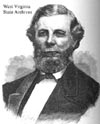 |
Arnold, George A resident of Lewis County, Arnold was elected to the Legislature of Virginia in 1861. He served as a delegate for the Restored Government, and was on the committee that drafted a bill for the formation of a new state. |
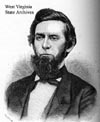 |
Atkinson, John Atkinson, a businessman and attorney from Hancock County, attended the First Wheeling Convention and was elected a member of the Second Wheeling Convention. He served as a state senator for West Virginia upon its formation. |
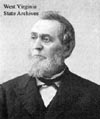 |
Atkinson, John See above. |
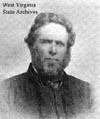 |
Battelle, Gordon Battelle was a Methodist minister in Wheeling, and served as chaplain of the First West Virginia Infantry. He was elected a delegate to the Constitutional Convention and proposed several amendments addressing the abolition of slavery in West Virginia. Battelle died on August 7, 1862. |
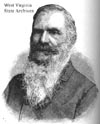 |
Blair, Jacob Prior to the Civil War, Blair, a Parkersburg native, was selected to fill a congressional seat, and was re- elected in 1863. Blair was instrumental in convincing President Lincoln of the necessity of signing the statehood bill. |
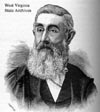 |
Boggess, Caleb Boggess was elected to represent Lewis County in the Richmond Convention, which resulted in the secession of Virginia. |
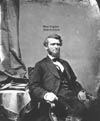 |
Boreman, Arthur Boreman, who had practiced law in Parkersburg before the war, served as president of the Second Wheeling Convention, and upon statehood, became the first governor of West Virginia. He later served as a United States senator from West Virginia. |
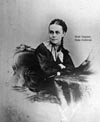 |
Boreman, Laurane On November 30, 1864, Laurane Bullock of Wheeling married Governor Arthur I. Boreman. |
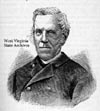 |
Boughner, James Dr. James R. Boughner of Monongalia County served as a delegate to the First Wheeling Convention. He was a paymaster in the Union Army from 1864 until the end of the war, then later served a term in the House of Delegates. |
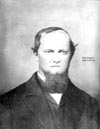 |
Boyers, J. Edgar Boyers of Tyler County, who published the Virginia Plaindealer, was elected as the first Secretary of State of West Virginia. He later served as president of the Board of Supervisors and was Free School Superintendent of Tyler County for six years. |
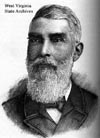 |
Brown, James Brown, a resident of Kanawha County, was a delegate to the Wheeling Convention, and a member of the Legislature of the Restored Government of Virginia. He was elected Judge of the 18th Judicial Circuit of Virginia, and to the Constitutional Convention. On May 28, 1863, Brown was elected a Judge of the Supreme Court of Appeals of West Virginia. |
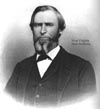 |
Brown, John James John James Brown of Preston County served as a delegate to the Second Wheeling Convention. He was later elected as a delegate to the Constitutional Convention, and served in the first three legislatures in West Virginia. |
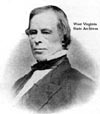 |
Brown, William Brown was elected congressman to represent the Reorganized Government of Virginia. |
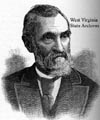 |
Burdett, John Burdett, a Taylor County native, served in the Richmond Convention, and voted against secession from the Union. He was a delegate to the First and Second Wheeling Conventions, and later enlisted in the Union Army. After the war, Burdett served in the West Virginia State Senate, and in 1870, was elected State Treasurer. |
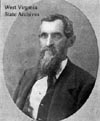 |
Burdett, John See above. |
 |
Campbell, Alexander Founder of Bethany College and the Disciples of Christ, Campbell served as a delegate to the 1829-30 Virginia constitutional convention. He fought to further the rights of western Virginians and sought educational reform. |
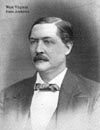 |
Campbell, Archibald The editor of the Wheeling Intelligencer at the time of the Civil War, Campbell used the newspaper to further the statehood effort. He is considered one of the founders of West Virginia despite having never held political office. |
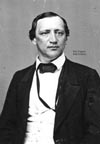 |
Carlile, John Carlile, who resided in Clarksburg, served as a state senator, a delegate to the Virginia Constitutional Convention of 1850-51, and congressman. He voted against secession in 1861, and headed the movement to break away from Virginia. He was elected to the United States Senate, where he drafted the statehood bill for West Virginia. By this time, Carlile had changed his mind regarding statehood. He sought to sabotage statehood efforts and voted against the bill. |
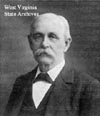 |
Cranmer, Gibson Gibson Cranmer of Wheeling served as a delegate to the First Wheeling Convention and was elected permanent clerk of the House of Delegates of the Reorganized Government of Virginia. He was later secretary of the First Session of the Second Wheeling Convention and appointed temporary secretary of the Constitutional Convention. |
